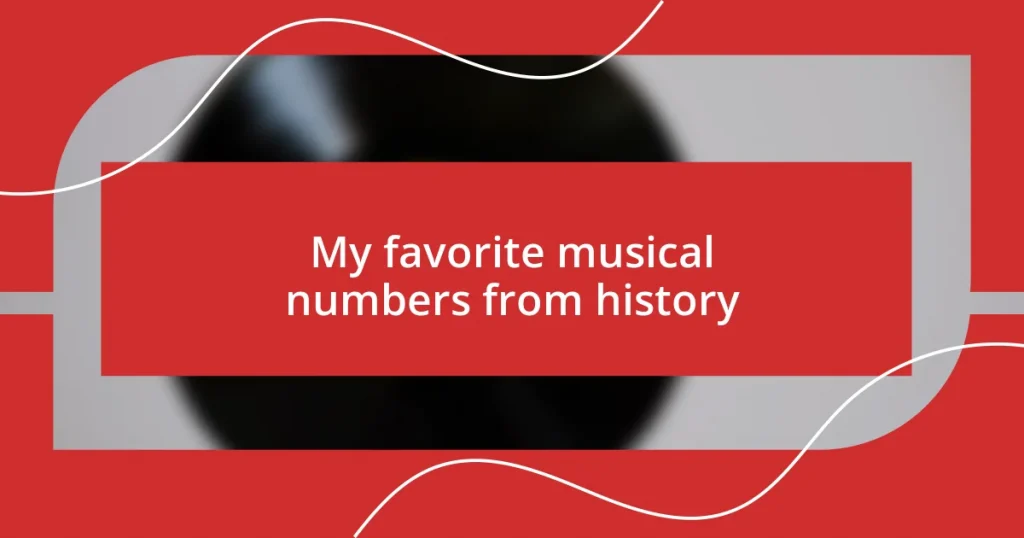Key takeaways:
- Musical numbers serve as cultural markers that reflect societal values, inspire resilience, and foster intergenerational connections.
- Iconic songs, such as “Hallelujah” and “A Change Is Gonna Come,” encapsulate pivotal moments in history and evoke deep emotional responses.
- Genres like blues, pop, and jazz enhance musical storytelling, while personal favorites highlight the profound impact of music on individual experiences and memories.
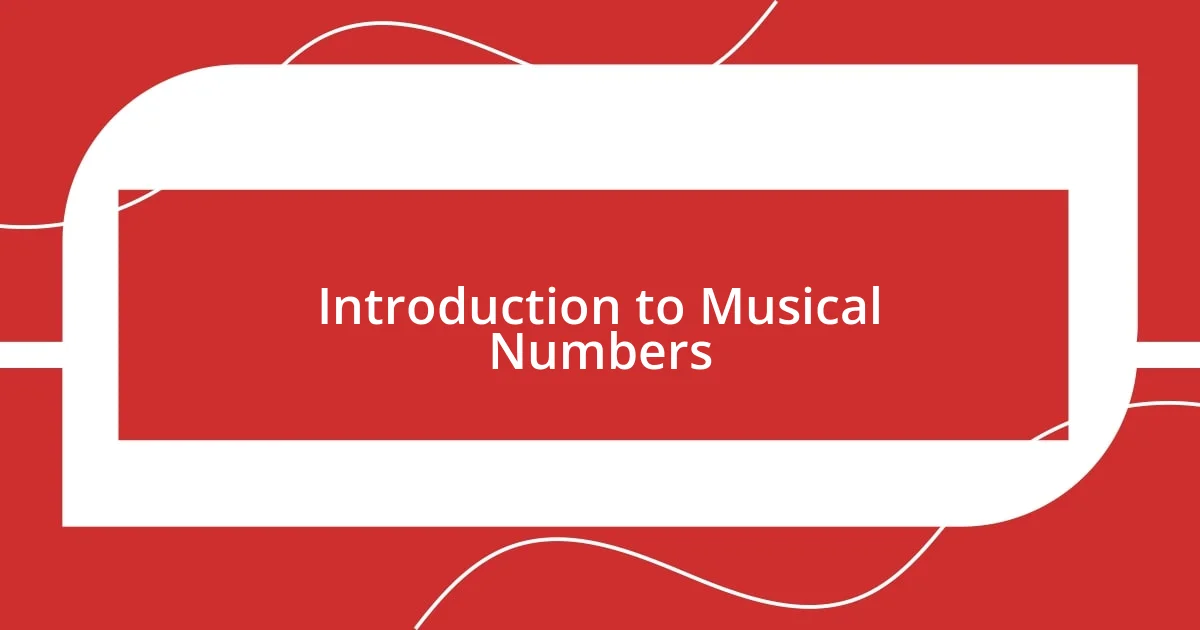
Introduction to Musical Numbers
Musical numbers have always held a special place in the tapestry of human expression. I remember the first time I heard “What a Wonderful World” by Louis Armstrong – it felt like the entire world opened up in that moment, a powerful mix of nostalgia and hope washing over me. These pieces not only entertain us; they often encapsulate entire eras, emotions, and cultural narratives, inviting listeners to connect deeply with their stories.
When we think about musical numbers, what comes to mind? Is it the soaring harmonies of a Broadway hit or the heartfelt strumming of a folk ballad? I find that each musical number has its own heartbeat, pulling at our emotions and transporting us to different times and places in our lives. It’s fascinating how a simple melody can trigger memories or stir feelings we thought were long forgotten.
Throughout history, musical numbers have not just been about sound, but about rhythm and resonance. Take, for example, the life-altering impact of “Imagine” by John Lennon; it’s almost impossible not to reflect on its message of peace and unity. Each note tells a story, and each lyric evokes a feeling. How can something so seemingly simple hold so much power? That’s the magic of musical numbers—they connect us in ways that words alone often cannot.
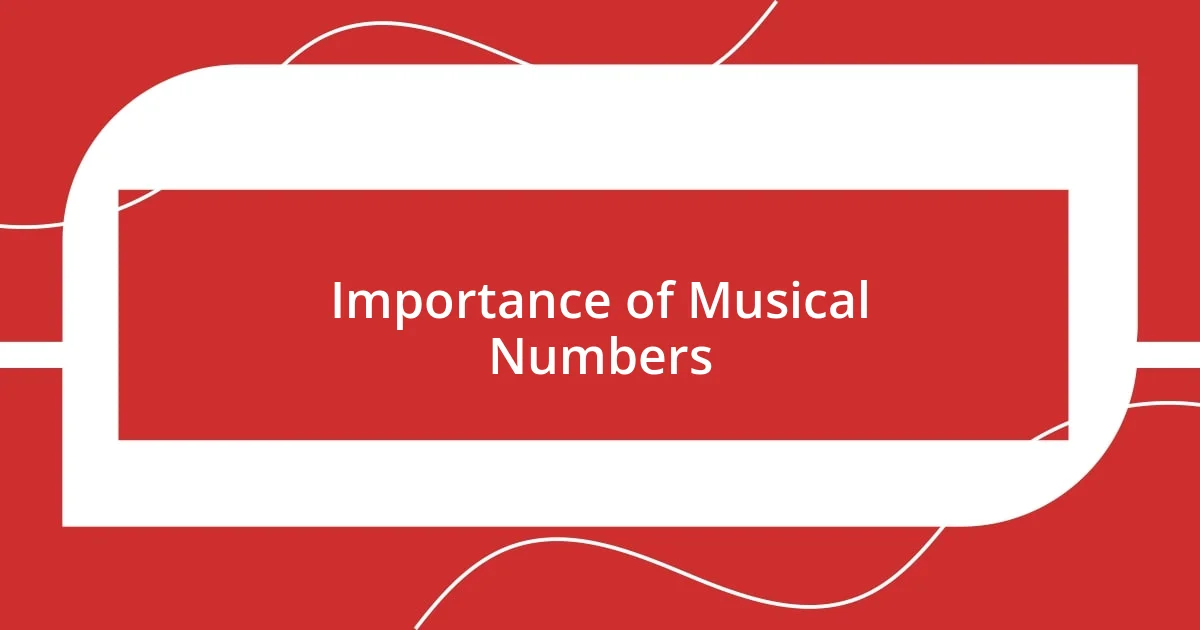
Importance of Musical Numbers
Musical numbers serve as powerful cultural markers, reflecting the values and struggles of their time. I recall listening to “Fight Song” by Rachel Platten during a particularly challenging period in my life. It instilled a sense of strength and determination in me, reminding me that music can empower individuals and inspire collective resilience. These pieces often resonate with historical context, making them significant beyond mere entertainment.
In a different light, the way musical numbers bridge generations fascinates me. For instance, after playing “Bohemian Rhapsody” at a family gathering, I watched the older generation sing along, sharing stories of their youth. Meanwhile, my younger cousins were transfixed, exploring how classic rock influences today’s pop music. Musical numbers create a shared experience among listeners of all ages, fostering connection and dialogue across time.
Musical numbers also provide a unique lens through which we can examine societal changes and movements. “Respect” by Aretha Franklin didn’t just become an anthem for women; it defined a movement and echoed the demands for equality. I believe this is what solidifies the importance of musical numbers in history—they are not merely art but are woven into the very fabric of social change.
| Aspect | Importance |
|---|---|
| Cultural Reflection | Musical numbers capture the essence of the era they originate from. |
| Generational Bridge | They connect individuals across different ages, promoting intergenerational dialogue. |
| Social Impact | Many numbers encapsulate significant movements, influencing change and societal perceptions. |
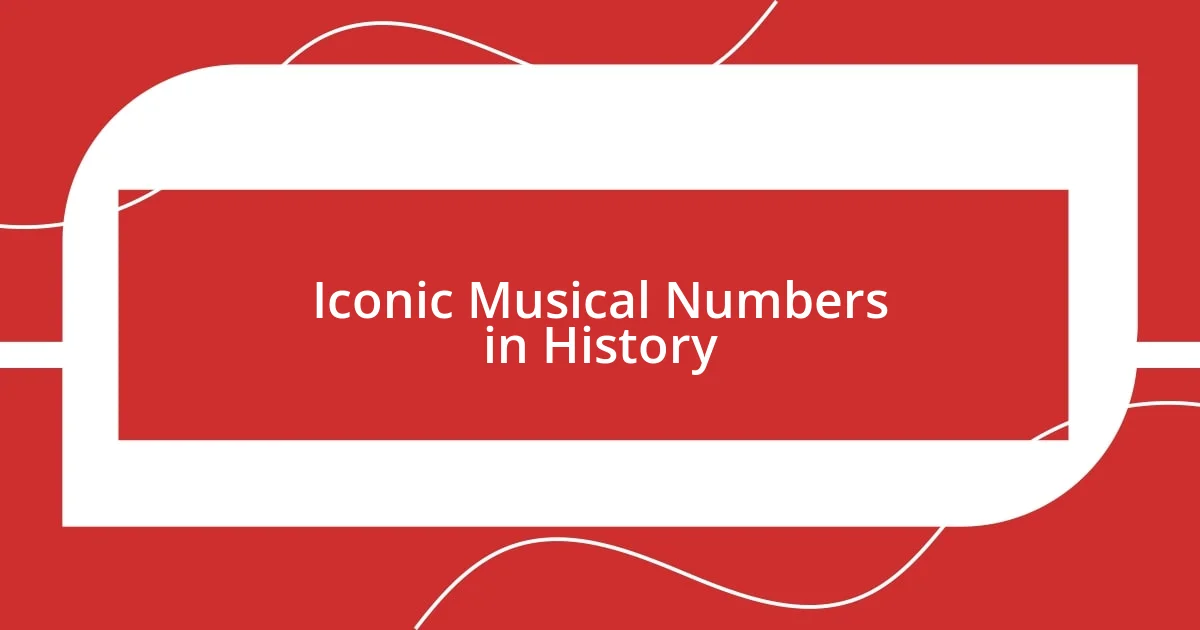
Iconic Musical Numbers in History
When I think of iconic musical numbers, one that immediately resonates with me is “Hallelujah” by Leonard Cohen. The way its haunting melody intertwines with lyrics that reflect love, loss, and a search for meaning strikes a chord in the hearts of many. I distinctly remember a chilly winter evening, curled up with a warm blanket, listening to various renditions, feeling the collective sorrow and joy embodied in the song. Music like this transcends time, showing us how deeply feelings can be encapsulated in just a few verses.
Some of the most unforgettable musical numbers throughout history include:
- “Over the Rainbow” – Judy Garland: An emblem of hope that encourages dreamers to seek their own arc.
- “Stayin’ Alive” – Bee Gees: A disco anthem that not only defined an era but also inspired a generation with its infectious beat.
- “Let It Be” – The Beatles: A soothing reminder that in times of turmoil, peace can be found through acceptance.
- “I Will Always Love You” – Whitney Houston: An emotional powerhouse that showcases the depth of love and heartbreak.
- “A Change Is Gonna Come” – Sam Cooke: A poignant representation of the civil rights movement, offering a sense of hope amidst struggle.
These musical numbers do more than just entertain; they serve as milestones of human experience, capturing the essence of our shared journey.
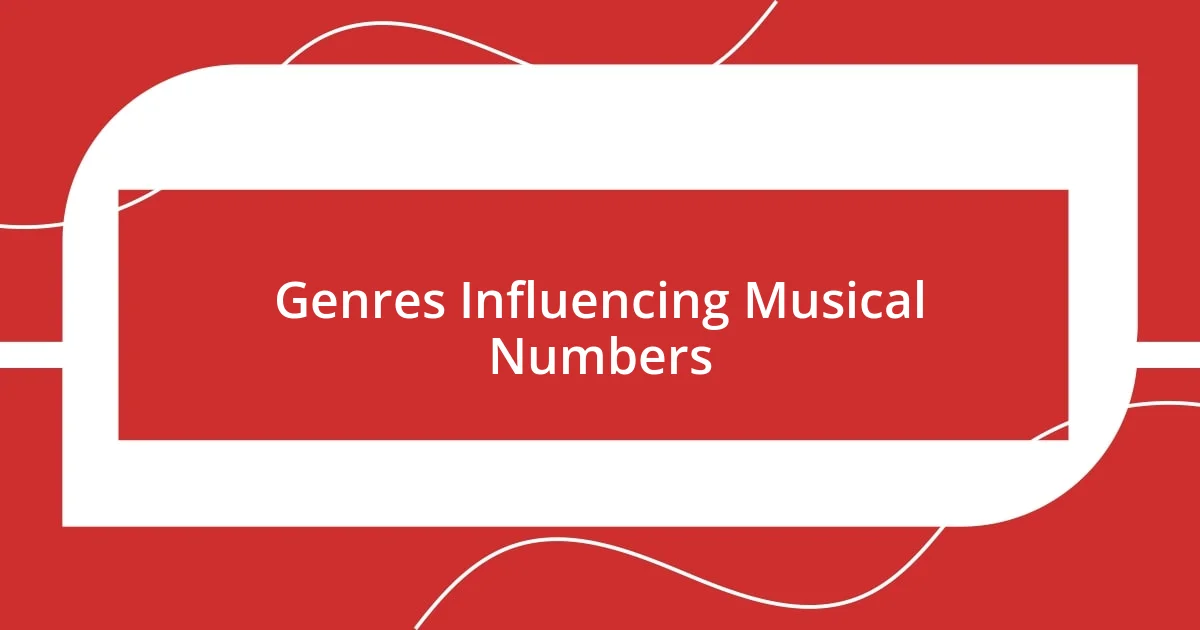
Genres Influencing Musical Numbers
The influence of various genres on musical numbers cannot be understated. For instance, the raw emotion found in blues music often seeps into musical theater, creating scenes that evoke a powerful sense of longing and heartbreak. I remember watching a production of “The Color Purple,” where the blend of gospel and blues made every note resonate deeply within me, making the characters’ journeys all the more impactful. Isn’t it fascinating how genres can intertwine to amplify emotions?
Pop music, with its catchy hooks and rhythms, has also made its mark on musical numbers, leading to unforgettable anthems that get stuck in our heads. I’ll never forget the thrill of belting out “You’re Welcome” from “Moana” during a road trip, as the vibrant pop elements transformed a simple story into a fun sing-along experience. This blending allows music to transcend barriers, enabling different styles to communicate universal feelings of joy and empowerment.
In contrast, the sophistication of jazz has influenced countless musical numbers, infusing them with improvisational flair and rhythm. Think about the iconic “All That Jazz” from “Chicago.” When I first heard it, the jazzy undertones took me to a smoky, dimly lit jazz club. The vibrant energy left me craving more, showcasing how one genre can elevate a story and draw us into its world. Do you feel the same when you hear jazz-infused melodies? It’s a compelling reminder of how genres shape not only the music we love but also the stories we tell.
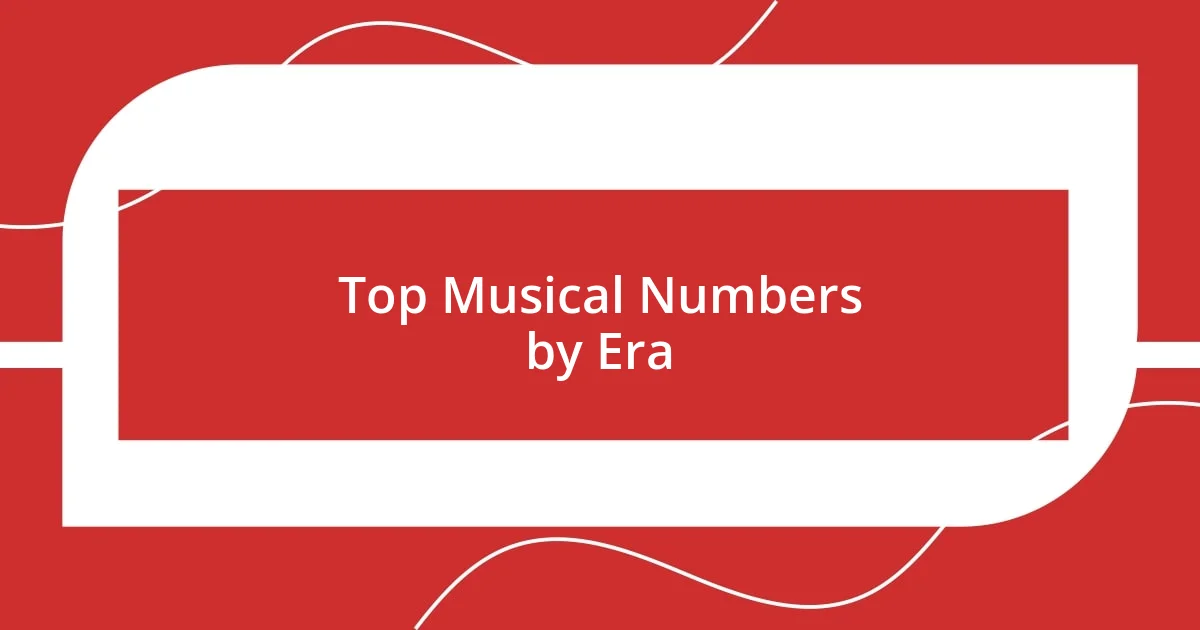
Top Musical Numbers by Era
When I reflect on the top musical numbers from the 1940s and 50s, I can’t help but think of “Singin’ in the Rain” by Gene Kelly. There’s something undeniably joyous about that tune. The way he dances through a rain-soaked street while expressing pure happiness resonates with a sense of freedom and optimism that feels timeless. It transports me back to cozy nights in a vintage diner, where the jukebox echoes classic hits, leaving me captivated by the magic of the era.
Shifting gears to the 60s and 70s, “Ain’t No Mountain High Enough” by Marvin Gaye and Tammi Terrell stands out in my mind. Its message of unwavering support and love is a reminder of the strength that comes from community and connection. I recall a summer gathering with friends where we cranked this song up, dancing like nobody was watching, igniting a spirit of unity and joy that filled the room. Isn’t it amazing how a single song can create such vivid memories and emotional bonds?
In the realm of modern hits, I can’t overlook “Rolling in the Deep” by Adele from the 2010s, which echoes themes of heartbreak and resilience. Hearing it for the first time struck me like a wave, as her powerful voice conveyed raw emotion. I remember a rainy afternoon, lost in thought, when that song came on, and every lyric hit home. It’s a testament to how music evolves yet continues to express our innermost feelings, reminding us that no matter the era, we will always find solace in a well-crafted melody.
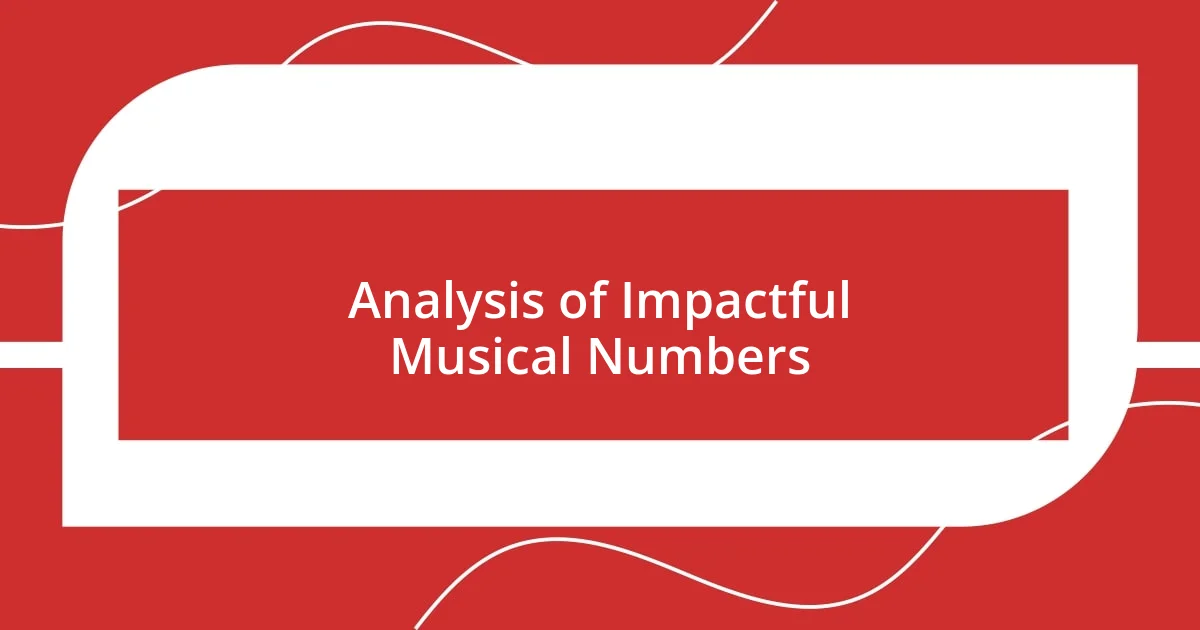
Analysis of Impactful Musical Numbers
Musical numbers often shape our emotional landscape, making them more than just entertaining interludes. Take “Defying Gravity” from “Wicked,” for instance; the soaring melodies and heartfelt lyrics transported me into a realm of empowerment. I recall belting out that anthem at the top of my lungs during a pivotal moment in my life, feeling an exhilarating rush that inspired me to embrace my individuality fully. How can a song encapsulate such powerful feelings and encourage personal growth?
Another excellent example is “The Circle of Life” from “The Lion King.” The way it opens the entire story always fills me with a sense of awe and reverence. The imagery paired with the rich harmonies creates a connection to nature and life’s journey that is universal. It’s hard not to think about our own place in the world when that powerful chorus hits. Have you ever felt like a song gave voice to your deepest thoughts, guiding you through life’s transitions?
Moreover, the fusion of storytelling and musicality in songs like “Let It Go” from “Frozen” demonstrates the impact musical numbers can have on a cultural level. That song became an anthem of liberation for so many, myself included. I distinctly remember watching the film with a group of friends, and as we sang along, it sparked a deep conversation about letting go of our pasts. Isn’t it amazing how a simple melody can ignite discussions that resonate beyond the theater and into our lives?

Personal Favorites and Their Stories
One of my all-time favorites has to be “Bohemian Rhapsody” by Queen. I vividly remember the first time I heard it while driving home after a long day. The way Freddie Mercury’s voice shifts from haunting to exuberant had me tapping the steering wheel, completely absorbed in the storytelling. Can a single song really take you on such a wild emotional journey? For me, it does, with every note revealing another layer of complexity.
Then there’s “Somewhere Over the Rainbow,” which brings back personal memories of sitting on my grandmother’s lap as she sang it softly in her worn-out armchair. It’s incredible how those simple lyrics carry the weight of hope and dreams. I still feel that warmth whenever I hear it, evoking a sense of longing and nostalgia that’s both comforting and bittersweet. Have you ever felt a song remind you of a person or moment that shaped you?
Finally, I can’t help but mention “What a Wonderful World” by Louis Armstrong. I remember listening to it during a quiet evening walk, when the sun was dipping below the horizon. As the gentle melody wrapped around me, I couldn’t help but smile at the beauty of the world and the small miracles that surround us daily. Isn’t it profound how music can transform a mundane moment into something extraordinary, making us appreciate life’s simple joys?










